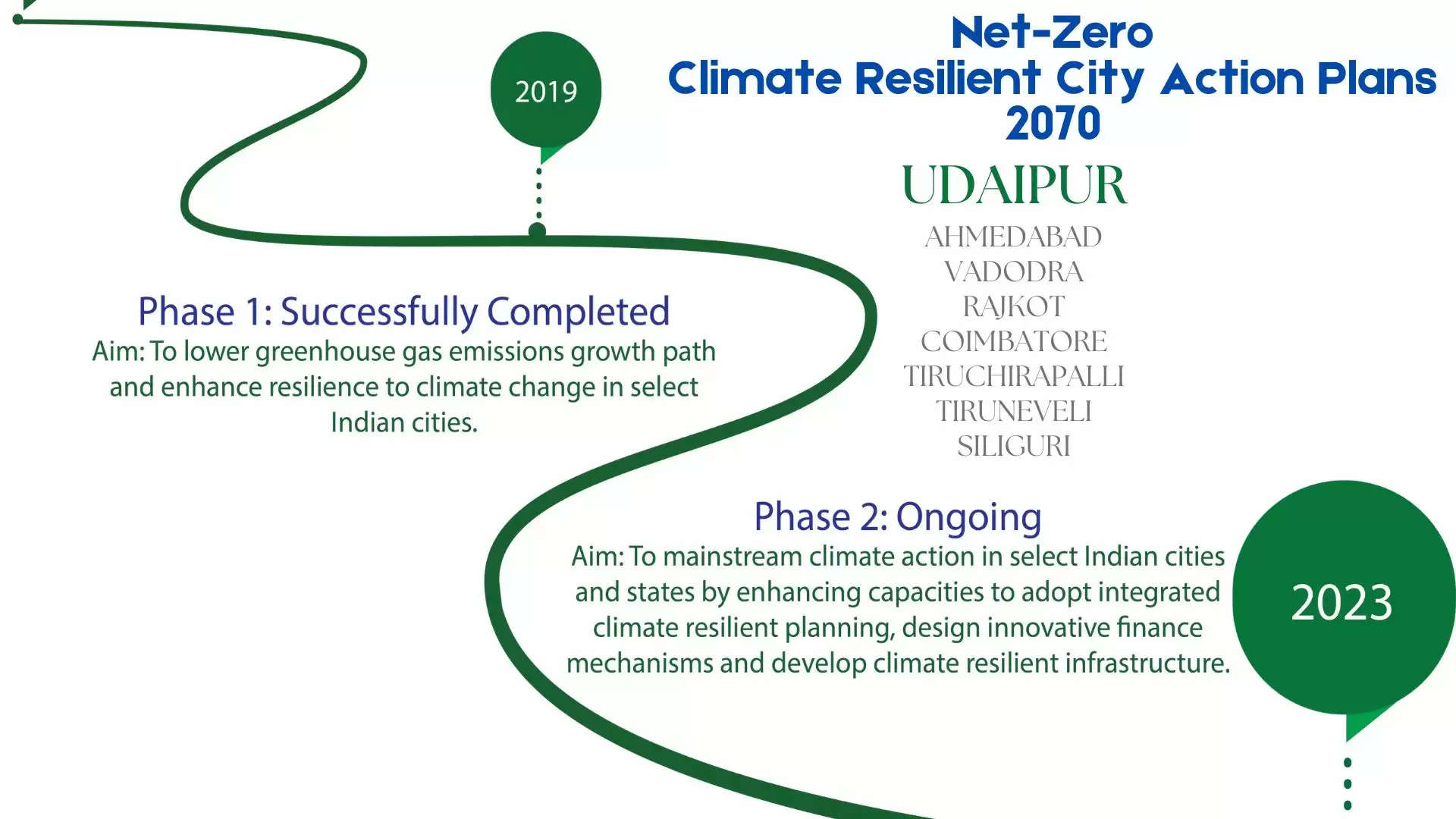Historic launch of Net-Zero Climate Resilient City Action Plan 2070 for 7 Indian cities including Udaipur
Plan is to reduce Udaipur's Greenhouse Gas Emissions to Zero by 2070 and prepare the city to deal with the adverse effects of climate change...
At the National Workshop on Multi-Level Action for Climate Resilient Cities, held on September 18 and 19, 2024, seven Net-zero Climate Resilient City Action Plans 2070—for the cities of Ahmedabad, Rajkot, and Vadodara, Coimbatore, Tiruchirapalli, Tiruneveli, Udaipur, and Siliguri—were jointly released for the first time in South and Southeast Asia. These initiatives are in line with Prime Minister Shri Narendra Modi's aggressive goal of having net-zero emissions by 2070, which was made public at the CoP26 in Glasgow in 2021.
The eight Indian partner cities' capacity to create and carry out low-carbon, climate-resilient plans has been greatly increased by the CapaCITIES initiative, supporting both national and international climate goals. Additionally, CapaCITIES provided the cities with training on how to plan large-scale bankable projects.
Workshop Organization and Key Attendance
Attendees at this "National Level Multi-Sectoral Workshop," which took place on September 18–19, 2024, included high-ranking representatives from several Ministries, cities, and foreign organizations. In his inaugural remarks, Hon. Minister of State for Housing and Urban Affairs Tokhan Sahu stated, "The extreme heat of 2024, recent heavy rainfall, and cold weather events reflect the gravity of climate change." Sahu served as the workshop's chair. The elderly, children, and the impoverished are the groups most impacted by these effects. As a result, it is crucial that we treat these measures for addressing climate change seriously.
Specific plans and findings for Udaipur
With funding from the Swiss Agency for Development and Cooperation, the Udaipur Municipal Corporation created this comprehensive action plan as part of the CAPACITIES initiative. The plan aims to prepare Udaipur for the negative effects of climate change and reduce the city's greenhouse gas emissions to zero by 2070.
The average annual temperature in Udaipur has risen by 0.60°C over the past century, according to the research. Moreover, the city's yearly rainfall decreased from 1901 to 2016. Forecasts for the future indicate that Udaipur's total rainfall will rise by 6–10% and the monsoon will rise by 40–60 mm by 2050. The likelihood of extreme weather events and heavy rainfall is also expected to rise, raising the possibility of natural disasters like urban flooding.
The city is susceptible to urban flooding due to its geographic configuration. The city's center and the sections close to the Ayad River see a lot of waterlogging. The study estimates that 13% of Udaipur's population—or 17% of the total—is impacted by urban flooding. An analysis of the effects of rising surface temperatures in Udaipur revealed that in 2021, 3,56,016 people, or around 64% of the population, will reside in locations with land surface temperatures (LST) exceeding 37°C. Temperatures in transit centers, residential communities perched on hillsides, educational institutions, and industrial sites frequently reach 42°C to 43°C.
Features of the Zero Plan and Financial Investments
The city's various urban districts will implement 137 action plans and 47 initiatives that make up the Net-Zero Climate Resilient City Action Plan 2070. Built environment and energy, transportation, water and waste management, stormwater management, solid waste management, urban greenery and biodiversity, and air quality are among the important sectors. Only with a variety of financial and policy backing from the federal and state governments will the proposal be feasible.
To reach the net-zero emission target by 2070, financial investments of over ₹1,21,000 million are expected to be needed.
Udaipur represented at the event
At the launch, Udaipur Municipal Corporation's Superintendent Engineers Mukesh Pujari, Bhupendra Salodiya, Akhil Goyal, and Karnesh Mathur took part. Arun Vyas, Chief Engineer, Directorate of Local Bodies, Government of Rajasthan, attended the function as well, representing both Udaipur and Rajasthan.
Speakers' Views
"Cities must plan for sustainability, strengthen climate finance, incentivize green jobs, and expand interventions", Rahul Kapoor, IAS, Joint Secretary, MoHUA.
"Switzerland's long-term planning and innovation-based development strategies can significantly contribute to India's urban climate adaptation", Philippe Sas, Head of the Swiss Agency for Development and Cooperation.
"India has achieved a significant breakthrough in urban climate action. With this action, India will establish itself as Asia's leader in climate sustainability", Imani Kumar, Executive Director, ICLEI South Asia.
"The main goal of this action plan is to prepare Udaipur for the adverse effects of climate change by improving municipal services such as water, electricity, solid waste management, sewage, storm water drainage, public transportation, building energy conservation, and greenery", said Bhupendra Salodiya, Manager of ICLEI South Asia. Under this strategy, the city of Udaipur will become more capable of adapting to climate change and develop toward a sustainable and green future.
This project is starting to take shape as a significant directive for Udaipur as well as other Indian towns, which will improve those cities' capacity to adapt to climate change. This action plan will also function as a template for similar plans in Rajasthan and other Indian towns, he added.
Other prominent personalities at the event included Rahul Kapoor, Joint Secretary, MoHUA and Mission Director, Smart Cities Mission, Shri Philippe Sas, Head of International Cooperation and Counsellor, Swiss Agency for Development and Cooperation (SDC), Dr. Debolina Kundu, Director, National Institute of Urban Affairs (NIUA), and Emani Kumar, Executive Director, ICLEI South Asia. The workshop was attended by over 150 government officials and urban experts from over 30 Indian cities.
To join us on Facebook Click Here and Subscribe to UdaipurTimes Broadcast channels on GoogleNews | Telegram | Signal



